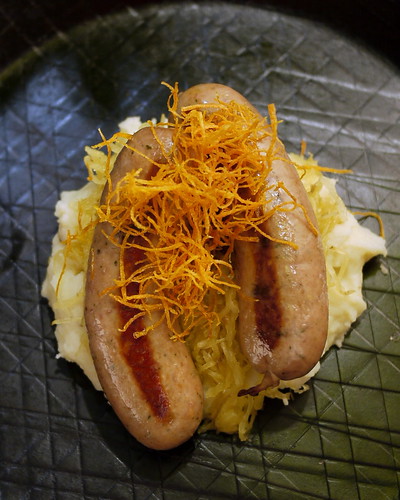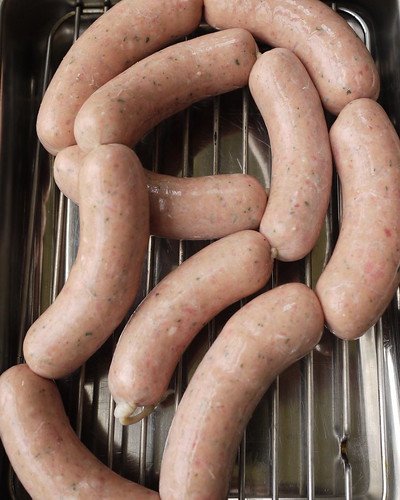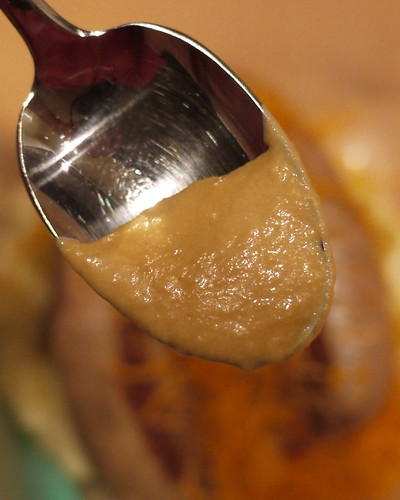
It's #britishsausageweek or British Sausage Week for my Twitter averse friends. Since Jamie Oliver is participating in the promotion of UK sausage, I figure I could do my bit from across the pond.
Americans have and odd relationship with British cuisine. On one hand we can't resist the urge to regurgitate the cliche of their food as heavy, tasteless and unimaginative. On the other I've lost track of how many gastro-pubs with English sounding names dot our fair city. But what about sausage?
Here in America we know only one British sausage, the Banger! Actually that's the nickname for about any sausage and what we call a banger would probably be the Cambridge sausage in the UK. The Oxford Companion of Food identifies no less than 10 British sausage varieties including one sausage, the Cumberland, which gained Protected Geographical Status, from the EU earlier this year. For my British Banger I chose to focus on the Cambridge sausage.

The Cambridge Banger
900g (2lbs) Pork Shoulder
100g (3 1/2 oz) Rusks or fine bread crumbs (see notes)
14g (2 t) Salt
3 g white pepper
1 g mace
1 g cayenne
4 g fresh sage chopped fine (see notes)
2 g fresh thyme chopped (see notes)
225 ml (1 cup) Ale (see notes)
Hog casings for stuffing.
Grind the pork shoulder twice, then using a mixer with a paddle attachment or a big wooden spoon beat in the rusks and then the remaining ingredients. Continue to mix until you get a uniform pate. Stuff into hog casings.
Notes:
A word about rusks. Many different food products are called rusks. The rusks for sausages are superfine breadcrumbs. Sausages in the UK have a long tradition of containing cereals of one kind or another. It probably started as a means to extend the meat, first for necessity, later for profit. Nevertheless adding bread crumbs changes the texture of the sausage in such a way that it must considered as part of the recipe. That said, I'm not a huge fan of it.
Try to use fresh herbs. Thyme and sage are ridiculously easy to grow. If using dried, use half the amount.
Ale: The alcohol in the recipe enhances the flavors from the herbs and spices. After cooking for 1 1/2 years in a brewpub, I have come to appreciate the properties of beer in recipes. Give it a try, if not use water.
Cooking:
British sausages got their nickname "banger" due to their propensity to explode during cooking. Do not blow up your banger. All sausages, especially ones without added fat, must be cooked gently, and not too long. I cooked these bangers (pictured above) in a 300F oven for 15 minutes.
So we have a banger, some mashed tatties, how about some sauce.

This piquant banger sauce is a pound of sliced onions caramelized then pureed with 3 ozs of Worcestershire and 3 ozs of butter. Wicked good, as the kids say.
Bangers and mash for British Sausage Week. Make it yours.
Cheers.
Sources (Book links to WorldCat)
British Charcuterie by Reekie
The Oxford Companion to Food by Davidson
03 November, 2011
Cambridge Sausage and Mash
Subscribe to:
Post Comments (Atom)


1 comment:
This sounds awesome and good to see you flying the flag for British Sausage Week across the ocean.
We use rusk or bread as a filler so when the meat contracts when it's cooking the filler helps the sausage keep it's shape.
The UK is a nation of sausage lovers. We have nearly 500 different varieties and if you take into account the way butchers make those you can eat a different sausage everyday for ten years!
I've been touring the country on a motorbike in search of the perfect sausage.
You can find recipes on my website (both to make sausages and to use sausages for) and during the weekend I will blog on lots of different sausage week events which have taken place.
About 12 million sausages are eaten every day by about 5 million people in the UK - we love them!
Post a Comment